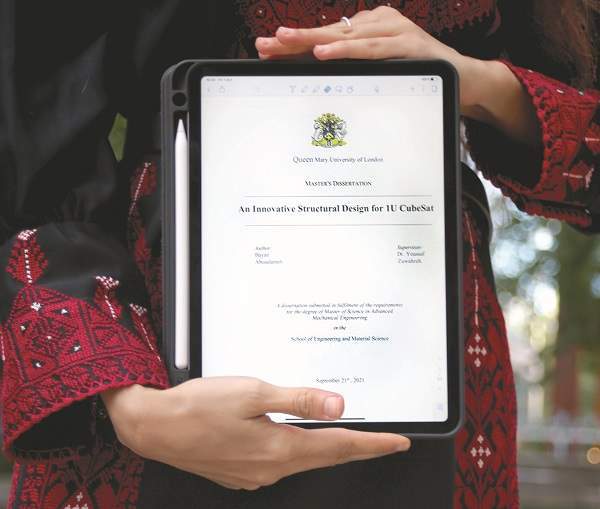AMMAN — A young Palestinian mechanical engineer, who graduated with a master’s degree from
Queen Mary University in the UK, invented a new kind of cube satellite she dubbed “Palestine_1”, which aims to study urban growth and water resources in the MENA region. Bayan Abu Salameh spent much of the COVID-19
pandemic away from family and friends studying abroad. She was always obsessed with space exploration and wanted to show the world what a Palestinian engineer can do.
اضافة اعلان
From the West Bank town of Jenin, Abu Salameh got a scholarship to study at Queen Mary University only after a previous rejection from Durham University. Undaunted she never gave up as she always knew that space was her destiny.
 Palestinian engineer Bayan Abu Salameh holds her dissertation on an innovative structural design for a cube satellite that she named after Palestine. (Photos: Christian Kollando)
Palestinian engineer Bayan Abu Salameh holds her dissertation on an innovative structural design for a cube satellite that she named after Palestine. (Photos: Christian Kollando)
“My dream is to work at NASA,” Abu Salameh said with a big smile in an interview with told
Jordan News. She has dreamt of space since she was six, and her life changed forever after reading the book “A Brief History of Time” by Stephen Hawking.
“I was 15 years old when I first read (Hawking’s) book, and I knew then I wanted to go to space and find out more,” Abu Salameh said. She decided to study mechanical engineering at
Birzeit University in 2014, a major that would help her to get closer to her passion.
“It wasn’t easy getting a master’s scholarship to study at Queen Mary University,” Abu Salameh recalled. “I remember a friend of mine, Mohammed Ibrahim, dragged me to orientation in Ramallah for the Chevening scholarship, and told me ‘please apply, it has your name on it’. I got it after my first try,” she said. It was that moment that set her on course to earning her master of science in advanced mechanical engineering.
She left early in the morning of October 13, 2020, crossing the bridge between Palestine and Jordan to a new life in London and cold weather, memories of Chai and Kunafah back home kept her warm while she proceeded to climb new heights.
A few days into her studies in London, Abu Salameh heard of the passing of a dear friend after an illness. “Losing him was the hardest thing I’ve ever had to cope with,” she said with sadness in her voice. But fond memories of her late friend kept her going.
“He always used to tell me ‘Bayan, the only thing I imagine you doing in your life is space, and it’s the only thing that suits you, so please do it,’ He was an amazing human being,” Abu Salameh said.
Leaving home at the height of the global pandemic was heart rending, but she never took this opportunity for granted and always had in mind to do something great for her country. “Our right as Palestinians is self-determination, I knew that we deserved to be recognized not only on this earth but in space as well,” Abu Salameh said.
Her masters dissertation was on an innovative structural design for a cube satellite that she named “Palestine_1” after her country. Abu Salameh started working on the project in March. The pressure she felt was immense, especially in May when Gaza was under attack and she worried about her family’s safety in the West Bank.
Growing up in Palestine she lived a unique life and experienced what few people do, living under Israeli military occupation. “It is time to show that Palestinians are not only sad stories, Palestinians represent hope and a strong faith. It is also my responsibility to show the other side of our people. We are intelligent, we care about science, and we care about international affairs,” said Abu Salameh.
Her parents, though proud of her, are also afraid for her safety, they know the history of Palestinian scientists killed by occupying forces.
Many kids dream of going into space, most soon forget about it, few pursue it as a career. Abu Salameh’s mother thought her daughter would outgrow dreams of space, but all changed after the young engineering student submitted her thesis. “It went viral on social media,” Abu Salameh said, “that’s when my mother started to believe I could really go into space.”
What started as her own passion and desire to build a satellite that carries her country’s name, has today become the dream of every Palestinian.
“Palestine_1’s” mission will be to study and collect data from the Middle East and North Africa region and to provide scientific solutions to pressing issues like those of urban growth and water scarcity. Abu Salameh believes the region’s problems need a scientific approach not just a political one.
She said the satellite was designated “one” because it will be the first, but by no means the last cube satellite in space. She hopes to develop a series of such satellites launched to study the region, thereby providing new opportunities for bright young Palestinian space enthusiasts in the space industry.
“I feel that Palestine will be the milestone of science and space research, I imagine myself in 10 years’ time being responsible for space research,” Abu Salameh said. She aims to take a free Palestine to space, where there are no walls and no limits for human achievement either.
Working towards her Ph.D, Abu Salameh is continuing to work on her project and trying to figure out how to fund the “Palestine_1” satellite project. She is keen that Palestine find a place among the stars.
Ever the driven optimist, she adds: “Wherever you go and whatever happens, keep in mind that this time will pass, the hard times and the good times, so try to enjoy it and live it as much as you can.”
Read more Lifestyle




